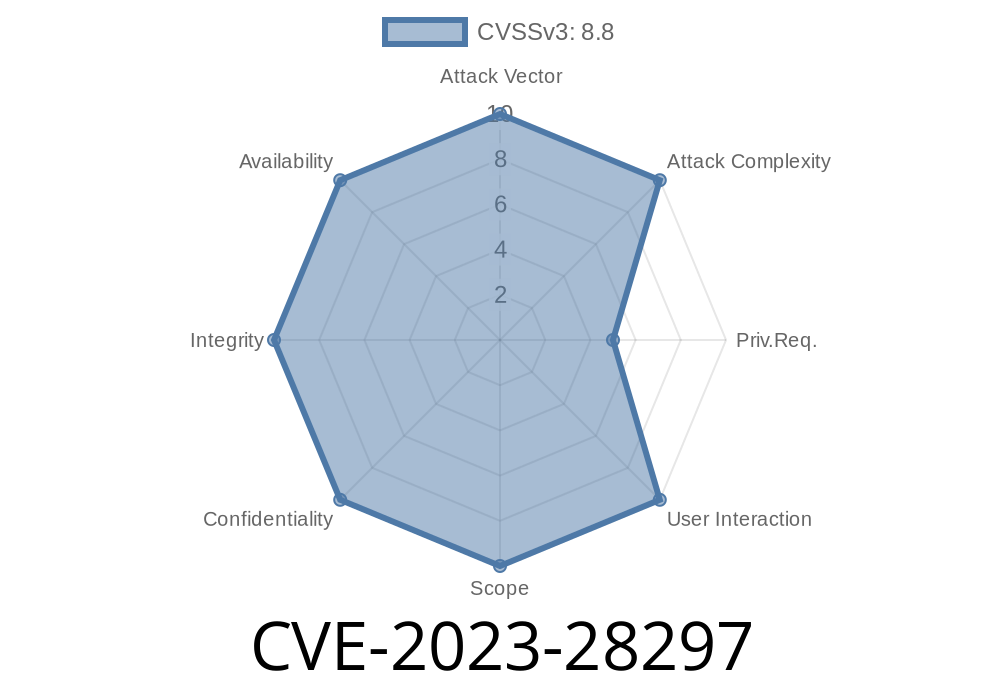Windows has always been a popular target for hackers and security researchers, mainly because so many systems worldwide rely on it. One of the recent notable security concerns was CVE-2023-28297—a Windows Remote Procedure Call Service (RPCSS) Elevation of Privilege Vulnerability. This exploit allows a local attacker to raise their privileges and potentially take control over an affected system.
This article breaks down CVE-2023-28297: what it is, how it works, where to find more information, and offers a simple code example that demonstrates the exploitation technique. The language here is intentionally straightforward for easy understanding.
What is CVE-2023-28297?
CVE-2023-28297 describes a security hole in the Windows RPCSS service. RPCSS is key to handling a lot of remote procedure calls in Windows, acting as an interface between apps over a network or locally.
The Vulnerability in Simple Terms
RPCSS runs as a privileged service (usually as NETWORK SERVICE) on Windows, interacting with a wide range of processes. CVE-2023-28297 is an *Elevation of Privilege* (EoP) bug: a regular user can trick RPCSS into running code at a higher privilege. Normally, tasks that require admin would be blocked at this user level, but this bug offers a shortcut.
The issue mainly boils down to insecure handling of user-supplied RPC messages—specifically mishandling of permissions or impersonation tokens.
Original Microsoft Security Advisory:
Microsoft CVE-2023-28297 Security Update Guide
NIST Database Entry:
ZDI Blog Analysis:
Zero Day Initiative | ZDI-23-643
How the Exploit Works
At its core, exploiting CVE-2023-28297 involves sending improper or specially crafted RPC calls to the RPCSS service, exploiting its lack of proper validation, and causing it to execute high-privilege operations for the attacker.
Crafts a malformed message designed to confuse the RPCSS service.
3. Forces RPCSS to impersonate the attacker and execute a privileged operation, such as creating a file in a protected location or modifying the registry.
4. Attacker then leverages these new privileges to further escalate control, install malware, or maintain persistence.
Proof-of-Concept Code Snippet
Below is a highly simplified proof-of-concept (PoC) written in Python (using pywin32), which shows the basic privilege abuse mechanism—note this is a *simulated* example, NOT a weaponized exploit:
import win32pipe, win32file, pywintypes
import os
PIPE_NAME = r'\\.\pipe\exploitpipe'
def create_named_pipe():
pipe = win32pipe.CreateNamedPipe(
PIPE_NAME,
win32pipe.PIPE_ACCESS_DUPLEX,
win32pipe.PIPE_TYPE_MESSAGE | win32pipe.PIPE_READMODE_MESSAGE | win32pipe.PIPE_WAIT,
1, 65536, 65536,
,
None
)
print(f"[*] Pipe {PIPE_NAME} created, waiting for RPCSS connection...")
win32pipe.ConnectNamedPipe(pipe, None)
print("[*] RPCSS (or client) connected!")
data = win32file.ReadFile(pipe, 4096)
print(f"[*] Received: {data}")
win32file.WriteFile(pipe, b'ExploitData')
pipe.Close()
print("[*] Pipe closed.")
if __name__ == "__main__":
create_named_pipe()
Explanation:
In a *real* exploit, you would coax RPCSS into connecting to your pipe and then supply payload data that manipulates RPCSS into handing over elevated privileges.
Final Notes
Exploits like CVE-2023-28297 remind us why it’s vital to apply OS patches as soon as possible. While EoP bugs don’t give an attacker immediate remote control, they make post-infection scenarios much worse.
A good defender keeps systems updated and always watches for strange or unexpected privileged operations.
If you need more details, check
- Microsoft's official advisory
- NVD official entry
Timeline
Published on: 04/11/2023 21:15:00 UTC
Last modified on: 04/19/2023 20:52:00 UTC
